DEPARTMENT OF CHEMICAL ENGINEERING NEWS
IN THIS ISSUE:
Building Community For Women in ChE
Helena Hagelin-Weaver, Ph.D., created an informal mentoring program that has grown signifcantly over the last 20 years

PAGE 16
Faculty News and Awards

PAGES 4-14
Student Success
PAGES 18-23
Alumni Highlights
PAGES 26-31
FALL 2022
U.S. News and World Report, 2023
Ph.D.
MESSAGE FROM THE CHAIR
Dear alumni, friends, and members of the UF ChE community,
Despite the lingering challenges of the pandemic, it has been exciting to watch as faculty, students, and staff have returned to campus to interact in classrooms, laboratories, and social and professional events, experiences that are the hallmarks of a university education. Students again interact face to face in lecture and laboratory courses and study groups. Student organizations have resumed their activities that are so important to developing lifelong networking and professional skills. Laboratories are buzzing with new discoveries and technologies. Chance encounters in hallways again result in new ideas and discussions among faculty and students. We’ve transitioned to a hybrid weekly seminar where we’ve hosted invited speakers from around the country either in person or virtually, and our faculty and students have had opportunity to attend national and international conferences and visit peers at other institutions. In short, it is great to see a return to the vibrant intellectual and cultural environment that characterized our department prior to the pandemic.
We are delighted to highlight some of the news and events that characterized the previous year.

In this issue we honor contributions by our faculty and alumni in building a supportive environment in our program and beyond. We honor Helena Hagelin-Weaver, Ph.D., an associate professor who founded and stewarded the Women in Chemical Engineering Program for the past 20 years, supporting our women students and faculty through social, professional, and peer mentoring activities (page 16). We also highlight Sindia M. Rivera-Jimenez, Ph.D., an affiliate assistant professor who received the inaugural AIChE IDEAL Star award in recognition to her contributions in support of the inclusion, diversity, equity, anti-racism, and learning goals of our professional society (page 14). Finally, we honor Jayant Shroff (B.S. ChE ’65) and his family, whose Shroff Family Foundation scholarship endowment is the largest providing financial support to our students, and for their philanthropic and community service contributions at home and abroad (page 30).
We also celebrate the continued growth and success of our faculty. We welcome new assistant professors, Josh Moon, Ph.D., and Juan Manuel Restrepo-Flórez, Ph.D., who will pursue research clean energy and water, and sustainability (page 4). We are also seeing tremendous growth in biomolecular engineering research in our department. Carl Denard, Ph.D., an assistant professor, will pursue use of machine learning and high throughput screening to reprogram proteases with support from the National Institutes of Health (page 5). Fan Ren, Ph.D., a distinguished professor, and Piyush Jain, Ph.D., an assistant professor, continue development of two distinct approaches for rapid testing for viruses and other pathogens (pages 6 and 10). Yeongseon Jang, Ph.D., and Dr. Denard aim to design minimal synthetic cells capable of sensing and self-manipulation with support form the National Science Foundation (NSF) (page 12). We hope you enjoy learning about these projects and other faculty honors and awards.
Our students continue to make us proud. Three received highly competitive NSF fellowships (page 18), while many others won accolades at local, national, and international venues (pages 19-21).
This year also saw changes to our staff. Deborah Sandoval retired after 38 years of service in various roles and Cynthia Sain retired after nearly 20 years as the department’s sole undergraduate academic advisor. We thank them for their dedication and contributions. We also welcomed Gabrielle Donalson, who will serve as one of our graduate academic advisors.
As always, we are grateful for the support from our alumni, in time, talent and treasure. Marissa Dockendorf (Ph.D. ChE ’05), shared her career progression and insights gained over 14 years in the pharmaceutical industry as the keynote speaker of the annual GRACE symposium (page 28). Students received numerous department scholarships and awards thanks to the support of our alumni (see pages 22-23). To learn more about how to support the department please refer to page 26.
I hope you enjoy reading this magazine and I look forward to hearing from you or seeing you at an upcoming event.
Sincerely,
Carlos M. Rinaldi-Ramos, Ph.D.

2 UF | DEPARTMENT OF CHEMICAL ENGINEERING
Carlos M. Rinaldi-Ramos,
Department Chair & Dean’s Leadership Professor
Cammy R. Abernathy, Ph.D. DEAN, HERBERT WERTHEIM COLLEGE OF ENGINEERING
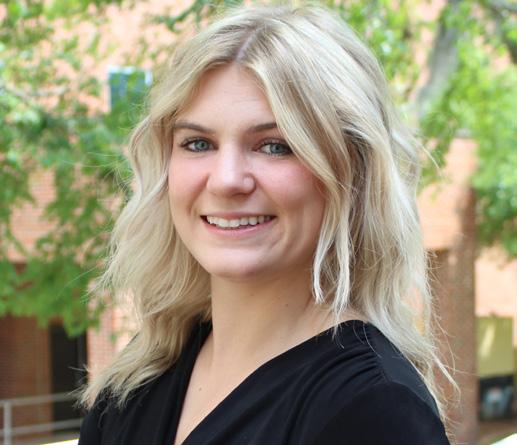

Carlos M. Rinaldi-Ramos, Ph.D.
DEPARTMENT CHAIR AND DEAN’S LEADERSHIP PROFESSOR
Advisory Board Members


V.R. Basker, Ph.D.
Zoe M. Baringara
Christopher J. Birdsall
Dane Boyington, Ph.D.
Sheila Boyington
Eric Bretschneider, Ph.D.
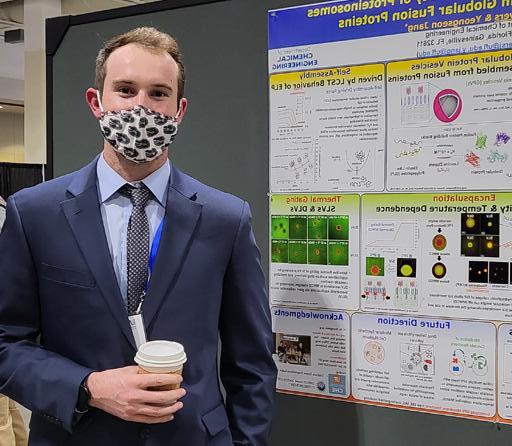
Steven L. Carson
Raymond Anthony Cocco, Ph.D.
Albert D. DaCosta
Michael Dickinson
Mary Beth Jakab
Wayne J. Johnson, Ph.D.
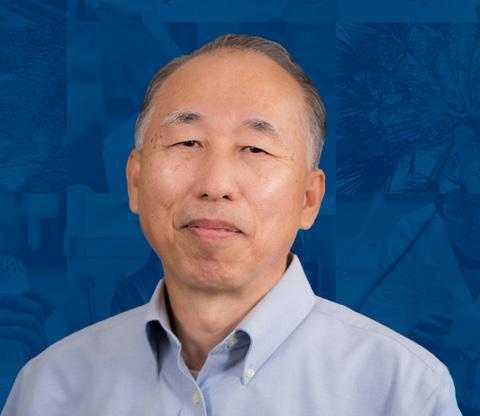
Steven Wayne Johnston, Ph.D.
William K. “Billy” McGrane, Ph.D., MBA
Alex Moreno
Jennifer Schutte
Michelle K. Runyon
Marketing & Communications Specialist and Magazine Editor
Department News 24-25
Faculty News 4-14
Alumni News 27-31
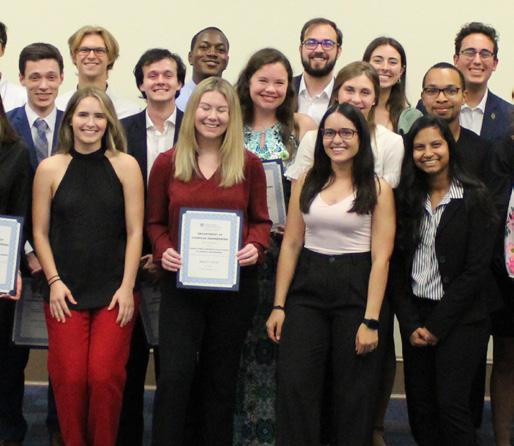
Student News 18-23
Department Support 26
3 CHE.UFL.EDU
INSIDE THIS EDITION | FALL 2022
New Faculty 4
Featured Article 16-17
ChE WELCOMES TWO NEW FACULTY MEMBERS
Joshua Moon, Ph.D ., will join the faculty as an assistant professor in January 2023.

Dr. Moon’s research focuses on designing advanced polymer materials for clean energy, clean water, and environmental sustainability. He combines modular polymer synthesis with experimental tools that probe both molecular-scale and macroscopic transport in polymers with the goal of informing predictive design of the next generation of materials for membrane-driven separations.
Dr. Moon was a postdoctoral scholar at the University of California, Santa Barbara, co-advised by Craig Hawker, Ph.D., a professor in the Department of Materials and Rachel Segalman, Ph.D., a professor in the Department of Chemical Engineering. He received his Ph.D. in Chemical Engineering from The University of Texas at Austin under the mentorship of Benny Freeman, Ph.D., and Donald Paul, Ph.D., in 2019 and his B.S. in Chemical Engineering from The University of Alabama in 2014.
Juan Manuel Restrepo-Flórez, Ph.D. , will join the faculty as an assistant professor in January 2023.

Dr. Restrepo-Flórez’s research lab will develop models and tools to enable systematic analysis of problems in the broader area of sustainability, with emphasis in integration of process synthesis, materials design, and product formulation for the production of advanced fuels.
Dr. Restrepo-Flórez was a post-doctoral research associate at the University of Wisconsin–Madison. Before accepting his position in Madison, he was a Ph.D. candidate at the Georgia Institute of Technology. During his Ph.D., he pioneered the use of metamaterials theory in mass diffusion and membrane applications. He holds a bachelor’s degree in biological engineering from the National University of Colombia and a master’s degree in chemical and biochemical engineering from the University of Western Ontario.
4 UF | DEPARTMENT OF CHEMICAL ENGINEERING NEW FACULTY
DENARD TO USE HIGH THROUGHPUT FUNCTIONAL SCREENING AND MACHINE LEARNING TO REPROGRAM PROTEASES
Carl Denard, Ph.D. , an assistant professor, was awarded a grant from the National Institute of Health and the National Institute of General Medical Sciences to combine, for the first time, machine-learning tools, next-generation DNA sequencing, and a yeast-based high-throughput functional screen to accelerate the isolation and design of protein-based protease modulators.

The functional selection will perform two tasks: select nanobodies from synthetic libraries based on a desired function and elucidate where a nanobody binds to a protease to elicit that function. These experiments will generate high-quality datasets that will train machine-learning algorithms to predict the potency, selectivity, and mechanisms of nanobody-based modulators based on their sequence features.
“This machine-learning-aided strategy will accelerate the discovery of rare and potent protease modulators and bypass the limitations of structure-based methods. Furthermore, curated datasets of protease modulatory nanobody sequences will provide reference and design guidelines for future experimental and in silico campaigns,” Dr. Denard said.
This work is of significant interest to biomedical research and public health and includes proteases relevant to Hepatitis C virus, cancer, COVID-19, Alzheimer’s disease, and diabetes. The research will provide a foundation to answer fundamental biochemical questions on how synthetic ligands can map and modulate the functional landscape of proteases and other protein-modifying enzymes.
Written by Michelle Runyon
5 CHE.UFL.EDU FACULTY NEWS
UF RESEARCHERS
HELP DEVELOP HIGHLY ACCURATE, 30-SECOND CORONAVIRUS TEST
With any highly infectious disease, time can be a killer.
It is crucial to get a test result for a pathogen quickly, lest someone continue in their daily lives infecting others. And delays in testing have undoubtedly exacerbated the COVID-19 pandemic.
Unfortunately, the most accurate COVID-19 test often takes 24 hours or longer to return results from a lab.
At-home test kits offer results in minutes but are far less accurate or sensitive.
Researchers at the University of Florida, however, have helped developed a COVID-19 testing device that can detect coronavirus infection in as little as 30 seconds and as sensitively and accurately as a PCR, or polymerase chain reaction test, the gold standard of testing. They are working with scientists at National Yang Ming Chiao Tung University in Taiwan.
Fan Ren, Ph.D. , a distinguished professor in the Department of Chemical Engineering, said the device could transform public health officials’ ability to quickly detect and respond to the coronavirus — or the next pandemic.

UF has entered into a licensing agreement with a New
Jersey company, Houndstoothe Analytics, in hopes of ultimately manufacturing and selling the device to medical professionals and consumers.
Like PCR tests, the device is 90% accurate, researchers said, with the same sensitivity, according to a recent peer-reviewed study published in the Journal of Vacuum Science & Technology B
“There is nothing available like it,” said Josephine Esquivel-Upshaw, D.M.D., a professor in the UF College of Dentistry’s department of restorative dental sciences and member of the research team that developed the device. “It’s true point of care. It’s access to care. We think it will revolutionize diagnostics.”
The device is not yet approved by the U.S. Food and Drug Administration. First, researchers said, they have to ensure that test results are not thrown off by crosscontamination with other pathogens that might be found in the mouth and saliva. These include other coronaviruses, staph infections, the flu, pneumonia and others. That work is ongoing.
The hand-held apparatus is powered by a 9-volt battery and uses an inexpensive test strip, similar to those used in blood glucose meters, with coronavirus antibodies attached to a gold-plated film at its tip. The strip is placed
6 UF | DEPARTMENT OF CHEMICAL ENGINEERING FACULTY NEWS
Fan Ren, Ph.D., Distinguished Professor
on the tongue to collect a tiny saliva sample. The strip is then inserted into a reader connected to a circuit board with the brains of the device.

If someone is infected, the coronavirus in the saliva binds with the antibodies and begins a dance of sorts as they are prodded by two electrical pulses processed by a special transistor. A higher concentration of coronavirus changes the electrical conductance of the sample. That, in turn, alters the voltage of the electrical pulses.
The voltage signal is amplified a million times and converted to a numerical value — in a sense, the sample’s electrochemical fingerprint. That value will indicate a positive or negative result, and the lower the value, the higher the viral load. The device’s ability to quantify viral and antibody load makes it especially useful for clinical purposes, researchers said.
The product can be constructed for less than $50, Esquivel-Upshaw said. In contrast, PCR test equipment can cost thousands.
The research team also is studying its ability to detect
specific proteins that could be used to diagnose other illnesses, including cancer, a heart attack and immune health.
Dr. Ren and his team had been developing semiconductor-based sensor devices long before COVID-19 for nonmedical purposes.
He noted that he is inspired in his work by the recent death of his wife, which was unrelated to COVID-19. He connects his grief to the mourning of the world at large.
“Almost a million people have died of COVID” in the United States, Dr. Ren said. “Those are so many tragedies. Old people. Young people. You name it. I said, ‘No, that’s it.’ That is too much.”
He said several institutions have worked on devices using a field effect transistor, or FET, like that found in the COVID-19 testing device his team is developing. But those devices are basically one-offs — a sample is applied directly to the FET, which means the transistor is not reusable and must be discarded.
That makes those devices expensive and impractical for mass testing, Dr. Ren said.
Then he hit on the idea of separating transistor from sample, like blood glucose meters that use test strips to collect a drop of blood after a lancet pierces a finger. This innovation, Dr. Ren said, makes the UF device unique, affordable and easy to use.
Dr. Ren said the device could be used for venues with large crowds, such as concerts, sporting events, classrooms, in addition to medical settings. Researchers say the unit would also provide access to accurate, inexpensive testing in rural areas or in developing nations.
And the personal uses, researchers say, are limitless — parties, baby showers, and other small gatherings.
“Yes or no. You’re infected or not infected. You get the answer right away,” said Dr. Ren.
Written by Bill Levesque
7 CHE.UFL.EDU FACULTY NEWS
The motherboard of a COVID-19 rapid testing device that UF Health researchers helped develop is seen here. The device can return a coronavirus test result as accurately and sensitively as the gold standard of testing, a PCR test, in 30 seconds.
(Photo courtesy of Houndstoothe Analytics.)
D EPARTMENT AWARDS TERM PROFESSORSHIPS
Helena Hagelin-Weaver, Ph.D., an associate professor, was selected to receive the Dr. and Mrs. Frederick C. Edie Term Professorship in Chemical Engineering for the 2021-2024 period.

The Hagelin-Weaver Research Group works on heterogeneous catalyst development and fundamental understanding of these catalysts at the atomic level. Their main research focus is on environmentally friendly, energy-related reactions.
Dr. Hagelin-Weaver served as one of the department’s Ph.D. Recruitment Coordinators and is a mentor with the Women in Chemical Engineering mentoring program. She also serves as faculty advisor for the Society of Women Engineers student chapter.
The Fred and Bonnie Edie Professorship was endowed in 2011 to recognize a faculty member of the Department of Chemical Engineering at the University of Florida for outstanding scholarship in education, research and service to the department and the chemical engineering profession.
Whitney L. Stoppel, Ph.D., an assistant professor, was selected to receive the William P. and Tracy Cirioli Term Professorship in Chemical Engineering for the 2021-2024 period.
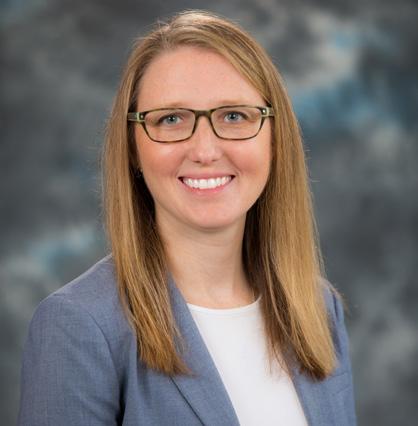
The Stoppel Lab builds dynamic and adaptable natural biomaterials that can be leveraged to alter the behavior of cells both in vitro and in vivo for repair and rehabilitation of damaged or diseased tissue.
Dr. Stoppel has an affiliate appointment in the J. Crayton Pruitt Family Department of Biomedical Engineering and is a member of the UF Myology Institute. She also serves as
one of the department’s Ph.D. Recruitment Coordinators, is part of the department’s diversity committee, and is a mentor with the Women in Chemical Engineering mentoring program. Additionally, Dr. Stoppel is an active member of professional societies, such as the American Institute of Chemical Engineers, where she served as programming chair for the Women in Chemical Engineering Committee in 2019 and for the Food Pharmaceuticals and Bioengineering Division in 2022, and where she has served as AIChE Future Faculty Mentor and Chair of the Future Faculty in Biomaterials Oral Session since 2019.
The William P. and Tracy Cirioli Term Professorship was endowed in 2015 to recognize a faculty member for outstanding scholarship in education, research and service to the department and the chemical engineering profession.
Jason F. Weaver, Ph.D., a professor, was selected to receive the Dow Chemical Company Foundation Term Professorship in Chemical Engineering for 2021-2024.

The Weaver Group focuses on advancing the understanding of reactions occurring on solid surfaces on a molecular level. Such reactions are fundamental to heterogeneous catalysis and semiconductor processing yet remain poorly understood at the molecular level. They investigate surface chemical reactions using analysis methods based on ultrahigh vacuum (UHV) surface chemistry and physics as well as in situ techniques.
The Dow Chemical Company Foundation contributes more than $18 million annually to charitable and educational institutions in Dow communities on behalf of Dow and its employees around the world. The foundation was organized in 1979 to fund science programs at secondary schools and universities.
8 UF | DEPARTMENT OF CHEMICAL ENGINEERING FACULTY AWARDS
Kirk J. Ziegler, Ph.D., a professor and associate chair for Graduate Studies, was selected to receive the Charles A. Stokes Endowed Professorship in Chemical Engineering for 2021-2024.
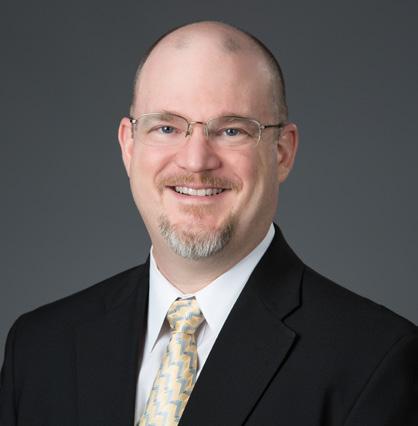
The Zeigler Research Group focuses on developing a fundamental understanding of interfaces in nanoscale systems, which can have far-reaching implications to various fields of nanotechnology.
The Charles A. Stokes Professorship was endowed in 1996 to recognize a faculty member of the Department of Chemical Engineering at the University of Florida for scholarship in education and research and outstanding service to the department and profession. This professorship commemorates those ideals practiced by Dr. Charles A. Stokes, a 1938 graduate of the department, during his long and successful career in our profession. The Charles A. Stokes Professor represents the values of our profession in their broadest context and serves as a role model for students embarking in a career that will demand responsiveness to societal needs.
FACULTY RECEIVE HERBERT WERTHEIM COLLEGE OF ENGINEERING EXCELLENCE AWARDS

Carlos M. Rinaldi-Ramos, Ph.D. , chair and Dean’s Leadership Professor, received the 2021-2022 Herbert Wertheim College of Engineering Doctoral Mentoring Award.
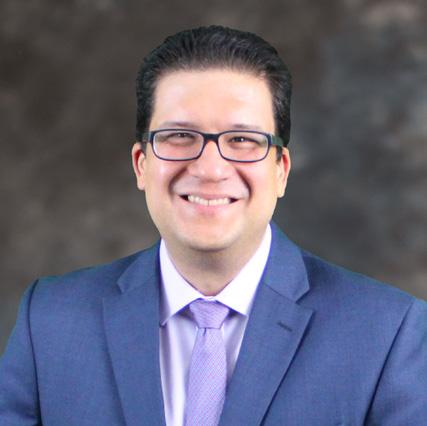
“Of all the many rewarding aspects of being a university professor, I enjoy mentoring students the most, especially in research. To me, discovery is most fun in collaboration with students, and I find the satisfaction of seeing students grow as scientists is a great way to counterbalance the frustration that often accompanies research at the forefront of knowledge,”
-Dr. Rinaldi-Ramos
Sindia M. Rivera-Jiménez, Ph.D. , an instructional assistant professor in the Department of Engineering Education and an affiliate faculty of the Department of Chemical Engineering, received the 2021-2022 Herbert Wertheim College of Engineering Doctoral Mentoring Award, and Undergraduate Faculty Advising/Mentor of the Year Award.
“My goal as a teacher and mentor is to foster cultural and social interactions that positively influence the way people learn and their sense of belonging and identity. Mentoring is the single most rewarding part of my job as a faculty because I am directly involved in my mentee’s persistence in the discipline, increased self-efficacy, and professional development.”
-Dr. Rivera-Jiménez
9 CHE.UFL.EDU FACULTY AWARDS
CHE.UFL.EDU 13
NEW COVID TEST CAN QUICKLY DETECT VARIANTS
UF researchers have invented a test that can determine within 10-15 minutes whether patients test positive for COVID and, if so, which of the five known variants of concern they have.
The research, published in The Lancet’s eBioMedicine , involves the use of a simple heating device and a cellphone. The team also used a new form of CRISPR — a means of finding and targeting a specific section of genetic material inside a cell — to quickly and effectively diagnose COVID and learn which variant of concern is in a patient sample: alpha, beta, gamma, delta, or omicron.
The finding could provide policymakers with vital information about when to require masking and prepare hospitals for a wave of infections. It could also allow patients and family members to prevent or treat a particular variant more effectively.
“For the medical and research community,
which
is
said corresponding author Piyush Jain, Ph.D. , an assistant professor and the holder of the Shah Rising Star Professorship in the Department of Chemical Engineering.

“If an especially serious variant like delta or a genetically similar variant, such as deltacron, arises in the future, work like this discovery will
help us track it earlier.”
The team, including professors Marco Salemi, Ph.D., Rhoel Dinglasan, PhD, MPH, MPhil, John Lednicky, Ph.D., and their lab members from the Emerging Pathogens Institute, made the findings in collaboration with two bioscience engineering companies registered in the Czech Republic. The companies helped the researchers engineer a prototype that could function at home, in a clinic, or in the field.
Current tests for determining COVID variants take several days to perform, which is why patients typically don’t learn which variant they have.
Advancing on recently published work, including by Long Nguyen , a Ph.D. candidate and the first author of the study, the UF team is the first to investigate the new heatloving CRISPR technology, which manages to combine speed, accuracy, and variant identification by amplifying and detecting coronavirus genetic material in one step.
The team also created a version of the test that can potentially be used at commercial testing centers, or even at home, and can be stored at room temperatures for weeks and activated by adding water.
The researchers validated the test in hundreds of clinical
10 UF | DEPARTMENT OF CHEMICAL ENGINEERING FACULTY NEWS
knowing
variants are emerging
extremely important,”
Piyush K. Jain, Ph.D., Assistant Professor and holder of the Shah Rising Star Professorship
samples, detecting all five variants with 97% accuracy within 30 minutes.
Dr. Jain, who says he hopes the product can be brought affordably to market soon, also worked with Dr. Dinglasan, a professor of Infectious Diseases & Immunology, and others to establish a startup called Genable Biosciences, LLC, centered around finding partners to manufacture and commercialize the new product.

Such groundbreaking and interdisciplinary work helps to prepare for future infectious disease outbreaks, said Dr. Salemi, a professor of pathology and member of the research team.

“Requiring expertise in biochemistry, molecular virology, and genomics, this work is an example of how the COVID pandemic has fostered collaborative research to unprecedented levels,” Dr. Salemi said. “I think what we have learned about rapid detection and surveillance of fast-spreading and mutating pathogens like SARS-CoV-2 will be crucial to face the challenge of future pandemics with strong intervention measures already in place.”
 Written by Catherine Arnold
Written by Catherine Arnold
11 CHE.UFL.EDU FACULTY NEWS
The UF team is the first to investigate the new heatloving CRISPR technology, which manages to combine speed, accuracy, and variant identification by amplifying and detecting coronavirus genetic material in one step.
Timeline of engineered CRISPR-based COVID tests developed by Dr. Jain’s Nano-Biomolecular Precision Lab
Current students in Dr. Jain’s Nano-Biomolecular Precision Lab
JANG AIMS TO DESIGN MINIMAL SYNTHETIC CELLS CAPABLE OF SENSING AND SELF-MANIPULATION
Yeongseon Jang, Ph.D. , an assistant professor, has received a National Science Foundation (NSF) grant to design minimal synthetic cells capable of sensing and selfmanipulation. In this project, Dr. Jang will collaborate with Carl Denard, Ph.D., an assistant professor, and Seok Hoon Hong, Ph.D., an associate professor at the Illinois Institute of Technology. This project combines the researchers’ expertise in polymer self-assembly, protein engineering, and cell-free synthetic biology for novel synthetic cell development.

“The development of synthetic cells is of great interest to identify the minimal requirements for cellular processes and to enable a range of novel biomedical applications. Among diverse cellular functions, sensing is one of the central functions in how living cells make decisions for biochemical synthesis. Proteins are essential biological building blocks in living cells to mediate cellular functions such as sensing, signaling, and cascade reactions, but mimicking complex cell functions using proteins is still challenging due to difficulties in the incorporation of functionally folded proteins into synthetic cell membranes with precise control. This project aims to create minimal synthetic cells that incorporate sensor proteins at membranes and enable self-manipulation by rational design and engineering of recombinant protein building blocks,” Dr. Jang said.

The researchers will demonstrate these functions by designing sensory fusion proteins that can selfassemble into vesicles and building transmembrane signal transduction systems with intracellular actuation capabilities. This project will create a new type of synthetic
cell, self-assembled globular protein vesicles, exhibiting sensory proteins in cell-like membranes with tunable permeability and fluidity. One of the cell-like functions will be demonstrated by integrating synthetic biology and protein engineering into the protein vesicle platforms, which will enable the self-maintenance of the synthetic cells by synthesizing its components autonomously.
“Ultimately, we aim to achieve programmable signal transduction and amplification cascades in protein vesicles upon sensing. Successful integration of cell-free protein synthesis into the protein vesicles capable of sensing will be the stepping-stone to enable the self-manipulation of synthetic cells. New biological and clinical applications could be envisioned for treating diverse human diseases based on manipulating protein functions in minimal cell structure. More importantly, this project will help to address questions on how to leverage synthetic systems for sophisticated biological reactions happening in living cells.” Dr.
Written by Michelle Runyon
said.
12 UF | DEPARTMENT OF CHEMICAL ENGINEERING
Jang
FACULTY NEWS
A schematic illustration of globular protein vesicles (GPVs) enabling transmembrane signaling through programmed protein assembly/disassembly. We aim to engineer recombinant protein building blocks at GPV membranes to bind upon sensing the inducer molecules, where split TEV can reconstitute for activation of T7 RNAP to transcript reporter molecules. This new class of vesicles will serve as minimal synthetic cell model.
FACULTY
HONORS AND AWARDS
Won Tae Choi, Ph.D.
• Received the Hanwha Non-tenured Faculty Award, 2022
Carl Denard, Ph.D.
Principal Investigator in a new $405,358 project funded by NIH NIGMS (R21) titled, “Machine Learning – Guided Engineering of Protease Modulators,” effective 2/22-1/23
David Hibbitts, Ph.D.
Awarded UF Term Professorship (2021-2024)
Piyush K. Jain, Ph.D.
• Principal Investigator in a new $419,375 project funded by the NIH (NIAID) titled, “Rapid pointof-care detection of Hepatitis C viral RNA using multiplexed CRISPR/Cas platforms,” effective 5/22-4/24
Principal Investigator in a new $419,375 project funded by NIH (NIAID) titled, “Rapid detection of Hepatitis C virus using CRISPR/Cas,” effective 9/21-8/23
Yeongseon Jang, Ph.D.
Principal Investigator in a new $651,624 project funded by the NSF titled, “Collaborative Research: Designing Minimal Synthetic Cells Capable of Sensing and Self-Manipulation via Tunable Self-Assembly,” effective 10/21-9/24
• Received KIChE President Young Investigator Award, 2021
Peng Jiang, Ph.D.
• Principal Investigator in a new $67,460 project funded by NSE Products titled, “Development of Chromatically Responsive Technologies for Nu Skin (Phase II),” effective 1/22-12/22
Ranga Narayanan, Ph.D.
Awarded UF Foundation Term Professorship (2021-2022)
• Named Fellow of the American Society for Gravitational and Space Research, 2021
Mark E. Orazem, Ph.D.
• Co-Principal Investigator in a new $4,421,314 project funded by the NIH (NINDS) titled, “Engineering the Neuronal Response to Electrical Microstimulation,” effective 8/22-7/26
Received The Electrochemical Society Corrosion Division H.H. Uhlig Award, 2022
Carlos M. Rinaldi-Ramos, Ph.D.
• Principal Investigator in a new $1,892,071 project funded by the NIH (NIBIB) titled, “Nanoparticles to Track T Cell Immunotherapy Using Magnetic Particle Imaging,” effective 5/22-1/26
• Principal Investigator in a new $374,641 project funded by the NIH (NCI) titled, “Nanoparticles for In Vivo Labeling of T Cells During Cancer Immunotherapy,” effective 6/22-5/24
• Principal Investigator in a new $156,984 project funded by the Canadian Institutes of Health Research titled, “Developing Magnetic Particle Imaging for In Vivo Cell Tracking,” effective 1/2212/26
• Named Fellow Society of Rheology, 2022
Sergey Vasenkov, Ph.D.
Principal Investigator in a new $272,735 project funded by NSF titled, “Collaborative Research: Quantifying the Role of Interfaces in Liquid Separation Membranes based on Carbon Molecular Sieves,” effective 7/22-6/25
• Principal Investigator in a new $100,000 project funded by ExxonMobil titled,” Diffusion of dissolved gases in porous solids and organic liquids,” effective 5/22-5/23
• Principal Investigator in a new $189,724 project funded by the NSF titled, “Collaborative Research: Crossing the percolation threshold for selective gas transport using interconnected crystals of metal organic frameworks in polymerbased hybrid membranes,” effective 7/21-6/24
Jason Weaver, Ph.D.
• Awarded UF Term Professorship (2021-2024)
13 CHE.UFL.EDU FACULTY AWARDS
RIVERA-JIMÉNEZ RECOGNIZED WITH AICHE IDEAL STAR AWARD
Sindia M. Rivera-Jiménez, Ph.D. , an instructional assistant professor in the UF Department of Engineering Education and an affiliate faculty of the Department of Chemical Engineering, was recognized by the American Institute of Chemical Engineers (AIChE) Societal Impact Operating Council with the new IDEAL Star award.
Dr. Rivera-Jiménez’s programming on “Unconscious Bias” was selected as one of two winners for the inaugural award that recognizes those who have created and executed outstanding programming that serves to further AIChE on the Inclusion, Diversity, Equity, Antiracism, and Learning (IDEAL) path.

AIChE believes that all who wish to be a part of the chemical engineering community should have equal opportunity to pursue and achieve success. It also proposes an IDEAL Path for progress, in an environment characterized by inclusion, diversity, equity, anti-racism, and learning.
“Dr. Rivera-Jiménez is a faculty member with a great compassion for all students. She is a leader in the Department of Engineering Education in ensuring everything we do, including our teaching, provides access and equity to all our students. The award is a wonderful
recognition of this work at the national level,” said Hans van Oostrom, Ph.D., founding chair and associate professor of the department of engineering education.
In addition to this recognition, Dr. Rivera-Jiménez will be invited to participate in a virtual panel to discuss developing successful IDEAL programming.
“Dr. Rivera-Jiménez created a workshop that guides participants to understand how unconscious bias is manifested, its negative impact, and strategies for avoiding pitfalls and lessening its frequency. So far, the workshop has been offered at the spring and fall 2021 AIChE meetings, and it was highly successful both times,” said Spyros A. Svoronos, Ph.D., Harry and Bertha Bernstein Professor and Undergraduate Program Coordinator in the Department of Chemical Engineering.
Dr. Rivera-Jiménez’s research includes agency in engineering communities (e.g., faculty, design teams, organizations), action research, curricular implementation of problem-solving pedagogies in process design using simulations, collaborative and inclusive environments in engineering teams, K-12 Outreach in product design, and professional development for industry and academia.
14 UF | DEPARTMENT OF CHEMICAL ENGINEERING FACULTY AWARDS
Dr. Sindia Rivera-Jiménez (right) receives the IDEAL Star Award at the 2021 AIChE Annual Meeting from June Wispelwey, Executive Director and CEO of AIChE.
SUCCESS AT THE AICHE ANNUAL MEETING

The 2021 Annual Meeting of the American Institute of Chemical Engineers (AIChE) was held in-person at the Hynes Convention Center, Sheraton Boston and Marriott Boston Copley Place in Boston on Nov. 7-11, and virtually on Nov. 15-19. UF students and faculty interested in innovation and professional growth participated and received many notable awards.
The UF AIChE Student Chapter received the Outstanding Student Chapter Award for the 4th year in a row. The award is presented annually to student chapters that show an exceptional level of participation, enthusiasm, program quality, professionalism, and involvement in the university and community.
contribute a lot of time to build a strong chapter,” said Sindia Rivera-Jimenéz, Ph.D., Instructional Assistant Professor and AIChE Chapter Adviser.
Brooke Erickson received the Freshman Recognition Award. This distinguished award is presented to one AIChE student member in each student chapter who has been the most active in their student chapter during their freshman year.
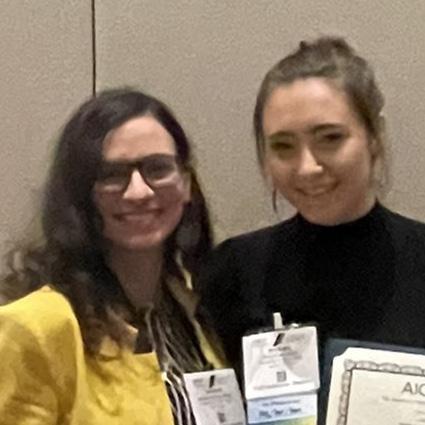
Sophie Williams received the Donald F. Othmer Sophomore Academic Excellence Award. This distinguished award is presented to one AIChE student member in each student chapter who has attained the highest scholastic grade point average during their first and sophomore years. Williams was also awarded the 2022 AIChE Central Flordia Section Scholarship.

Jackson Powers, a Ph.D. student in Dr. Yeongseon Jang’s research lab, won co-first place in the Materials Engineering & Sciences Division poster competition.
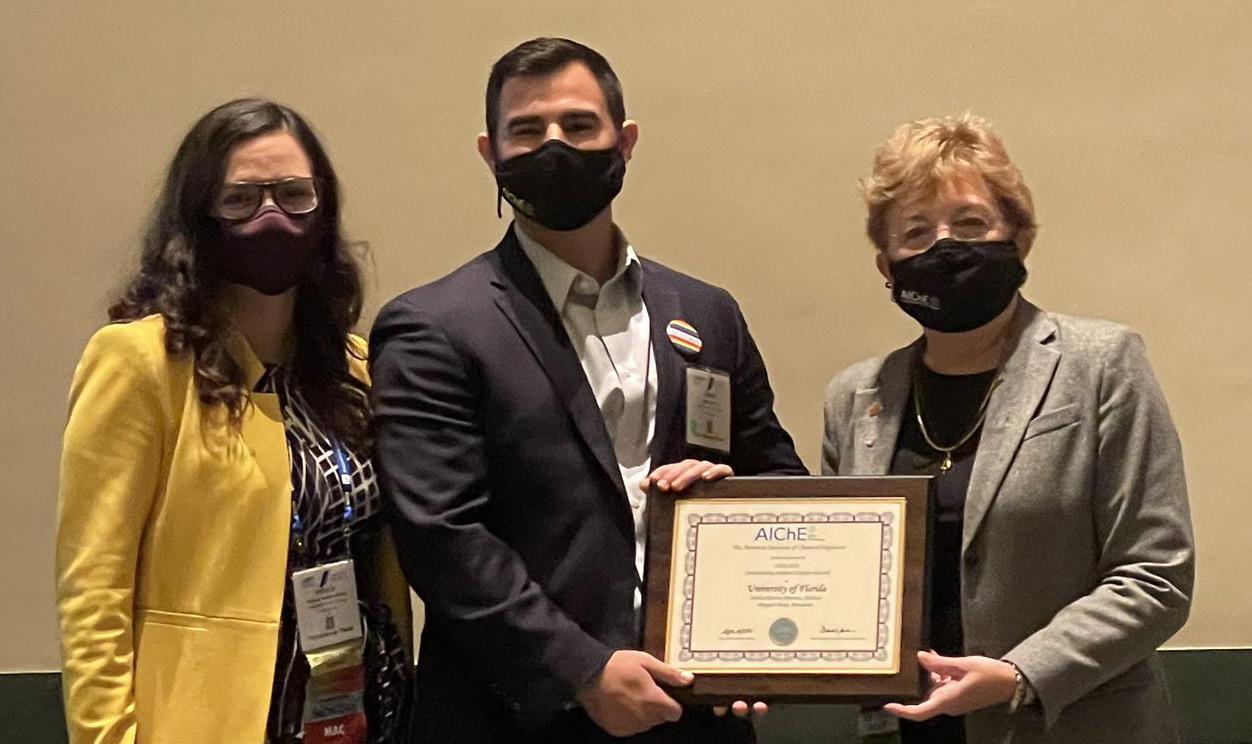
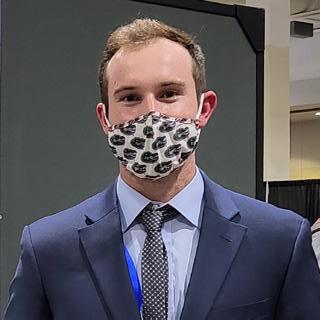
“This is my 4th year as the AIChE Chapter Advisor and I couldn’t be more proud! Our students are dedicated and
The Chem-E-Car team showcased their lead-acid, batterypowered car with a Chameleon clock stopping mechanism at nationals. They placed 10th out of 22 teams.
15 CHE.UFL.EDU STUDENT AWARDS
Dr. Sindia Rivera-Jimenéz and Brooke Erickson
Sophie Williams
Jackson Powers
The UF AIChE Student Chapter show their Gator pride at the 2021 AIChE Annual Meeting in Boston.
Dr. Sindia Rivera-Jimenéz and Samuel Sheek accept the AIChE Outstanding Chapter Award.
BUILDING A COMMUNITY FOR WOMEN IN CHEMICAL ENGINEERING
Identifying a need for female role models and mentors in Chemical Engineering at UF, Helena HagelinWeaver, Ph.D. , an associate professor, created an informal mentoring program that has grown significantly over the last 20 years.

“I realized during my postdoctoral years how fortunate I had been to have female role models during my Ph.D., so I wanted to make sure that our female students have access to female faculty mentors or role models,” said Dr. Hagelin-Weaver. “This initiative has since grown into a formal mentoring program with several female faculty mentors.”
When Dr. Hagelin-Weaver started as a Research Assistant Professor in the department, she wanted to make sure that female Ph.D. students had interactions with female faculty. It was also important to her to give students a platform to bring up potential issues that they might not want to talk about with their male advisors.
Initially, meetings were informal social events, where they met for coffee several times a year and talked
about topics of interest.
The Women in Chemical Engineering Mentoring Program was formally initiated during the 2004-2005 academic year, during the tenure of Jennifer Curtis, Ph.D., a former department chair and professor. During that time, the female Ph.D. students had a female department chair and role model. Dr. Curtis was very supportive of the mentoring efforts.
The department started to sponsor the meetings, and Dr. Hagelin-Weaver would invite female Ph.D. students to meetings once or twice a semester. She also initiated an annual Christmas gift exchange, and the group would meet and celebrate when one of the students graduated. The main goals of these meetings were getting to know other female students and faculty and provide informal mentoring.
When new female assistant professors were hired, Dr. Hagelin-Weaver began to formalize the program and the meetings. It was during this time that a new name for the program was also introduced: Women’s Advancement and Mentoring (WAM) committee.
16 UF | DEPARTMENT OF CHEMICAL ENGINEERING FEATURED ARTICLE
They expanded the program to first include female Master’s students and are discussing ways to include female undergraduate students. The topics of the meetings have evolved to include resume writing and how to give impactful presentations. Before the pandemic they also discussed ways to network at AIChE, and hosted a diversity discussion after watching the movie, Picture a Scientist.
In fall 2022, Dr. Hagelin-Weaver passed the leadership role to Janani Sampath, Ph.D., an assistant professor.
“Helena founded the Women in Chemical Engineering group at UF. This laid the foundation for regular meetups and professional development events which fostered a sense of community among female graduate students and faculty. This in turn led to the creation WAM, of which Helena is an active member. Without Helena’s efforts, WAM would not exist in its current form, and we are grateful for the initiative that she took early on in establishing this community,” said Dr. Sampath.
Written by Michelle Runyon
“The Women’s Advancement and Mentoring committee played an influential role in my professional and personal development while I was a Ph.D. student, and the members have continued to serve as friends and mentors

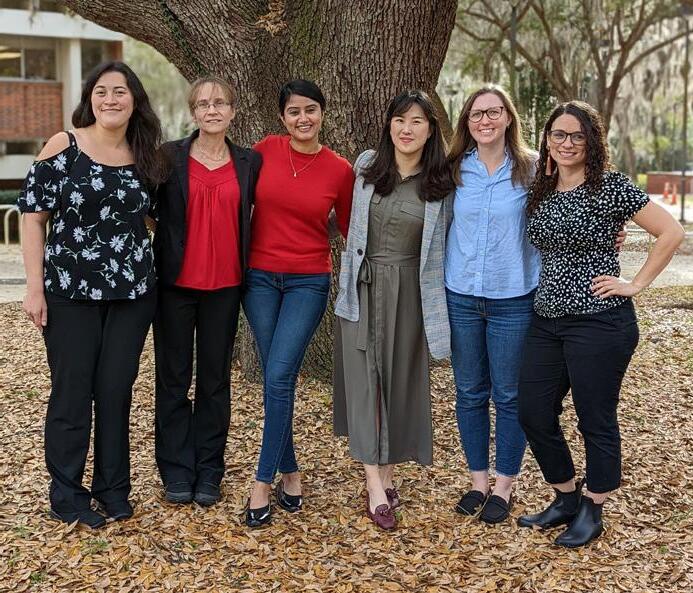
as I moved into my next role. I will always be grateful that Helena had the vision and initiative to establish and grow such a supportive community within the department.”
- Mykela Deluca, Ph.D. ’22 Postdoctoral Researcher, Purdue University
“It was very important that when I was a Ph.D. student figuring out what lab I wanted to research with, I found a lab that either had female representation or was actively trying to support female Ph.D. students. That was something that was (and is) very important to Helena as well and was one of the reasons I chose to work with her. As Helena’s first female Ph.D. student, I was excited to be in the lab because she was excited to have me in the lab. Helena always fostered my growth and inclusion in other career and personal development activities on campus. I always felt supported and championed by Helena: she was honest with me about a career in academics and while that isn’t the career trajectory I chose Helena actively disseminated my resume and helped connect me with the job I still currently have.”
- Samantha J. Roberts, Ph.D. ’16 Process Engineer (Dry Etch), Logic Technology Development, Intel Corporation



17 CHE.UFL.EDU FEATURED ARTICLE
NSF GRADUATE RESEARCH FELLOWSHIPS
Ph.D. students Elizabeth L. Aikman and Marisa O. Pacheco and alumnus Nico Mendez (UF B.S. ChE ’20) were awarded the National Science Foundation (NSF) Graduate Research Fellowship. These fellowships recognize and support outstanding graduate students in NSF-supported science, technology, engineering, and mathematics disciplines who are pursuing research-based master’s and doctoral degrees at accredited US institutions.
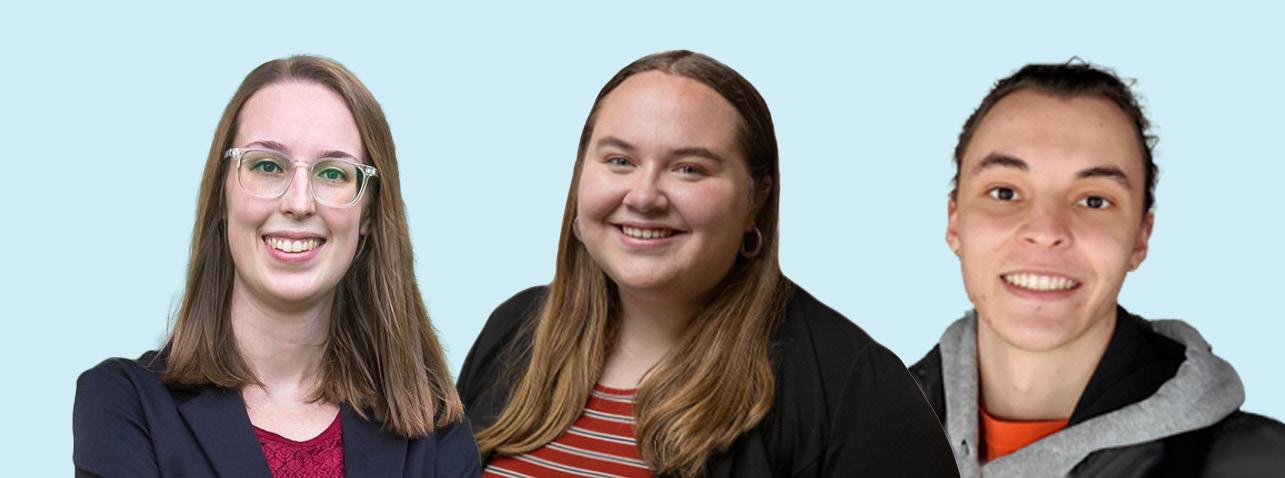
Aikman is pursuing her Ph.D. under the guidance of Whitney L. Stoppel, Ph.D. Aikman joined the Stoppel Lab in fall 2021 after completing a B.S. in Chemical Engineering at the University of Kansas.
“I feel very fortunate and honored to be awarded the NSF GRFP. As a first year Ph.D. student the application process provided an excellent opportunity to dive right into the content of my Ph.D. project and understand its potential impact. I could not have accomplished this without the support of Dr. Whitney Stoppel and my lab mates. This award will provide me with the support to pursue impactful research to advance my field and help me grow as a researcher and mentor,” Aikman said.
Pacheco is also pursuing her Ph.D. under the guidance of Dr. Stoppel. Pacheco joined the Stoppel Lab as an REU student during the summer of 2019, and again in fall 2020 after completing a B.S. in Chemical Engineering at the University of Colorado. She is currently contributing to a Department of Defense Congressionally Directed Medical Research Program project on silk particles with
“I am honored and grateful to be chosen as an NSF graduate research fellow. Going through the application process once as an undergraduate, and again this past year has helped me grow immensely in my skills, presenting research ideas, and advocating for myself. I am so thankful to the many people that helped me shape the application package, both peers and professors from UF and beyond. This recognition opens the door for many future endeavors related to my future career goals in the advancement of research, engineering education, and continued commitment to broader impacts,” Pacheco said.
Mendez is pursuing his Ph.D. under the guidance of Sanat K. Kumar, Ph.D., the Michael Bykhovsky and Charo Gonzalez-Bykhovsky Professor of Chemical Engineering at Columbia University. In the Kumar Research Group, Mendez works on the crystallization kinetics and dispersion of semicrystalline polymers. Mendez received a B.S. in Chemical Engineering from the University of Florida in 2020. At UF, he worked in the Colina Group in the department of chemistry, studying the adsorption of gases in polymers of intrinsic microporosity using monte carlo and molecular dynamics simulation techniques.
“I was thrilled to find out that I won the NSF GRFP award, and I am very thankful to the faculty at both the University of Florida and Columbia University who supported me in my application,” Mendez said.
18 UF | DEPARTMENT OF CHEMICAL ENGINEERING STUDENT NEWS
Pictured L to R: Elizabeth Aikman, Marisa Pacheco, and Nico Mendez
lab collaborator, Bruce D Spiess, MD, FAHA, in the UF Department of Anesthesiology.
STUDENT HONORS & AWARDS
Undergraduate students Alex Daves and Shawn Robertson , members of the 2021 UF iGEM Team earned a silver medal for their work addressing antimicrobial resistance by creating alternative selectable markers to antibiotic resistance genes.
The International Genetically Engineered Machine (iGEM) Foundation is an international competition for the advancement of synthetic biology. Team members included students from eight departments in five colleges!
Sitong Liu was awarded the Best Nano-particles Poster at NanoDay 2021
Nicolas Macaluso received the 2021-2022 Graduate Student Teaching Award from the UF Graduate School. He also received the Herbert Wertheim College of Engineering Outstanding Gator Engineer M.S. Scholar Award in 2022.
William O’Brien was selected by NASA to do a summer research internship for 9 weeks in Summer 2022.
Ph.D. student Jason Livesay and undergraduate students Zach Karpinski and R. Craig Singiser conducted microgravity flight experiments on ZERO-G parabolic flight campaigns in December 2021 and May 2022.
Hayden Good was awarded Best Oral Presentation for the NanoDay 2022 NanoPhysics Session.
Sarathy K. Gopalakrishnan was selected by the UF Research Abroad for Doctorates program to do research at the University of Lille, France for a period of four months from April-July 2022. He was also awarded the 2021 AAC Best Student Poster Award
Igin Benny Ignatius was selected as a Chateaubriand Fellow by the French Embassy to visit University of Paris Saclay for a period of four months between March-July 2022.
Julie Jameson recieved the 2022 Graduate Student Mentoring Award and the 2022 Association for Academic Women’s Emerging Scholar Award.
Amanda Orta Santana served as captain of the Berlin Heart Division of the Dream Team Engineering organization. She and the team partnered with doctors at UF Health Shands Hospital to design and build interactive models, such as lego hearts and a mini version of the Berlin Heart Device. The educational tools are used to lower the stress of children going through open heart surgery.
Chan-Wen and Jian Sian Li received the thirdplace poster presentation award from the 2022 (FLAVS) Florida Science and Technology of Materials, Interfaces and Processing American Vacuum Society.
Brendan Wernisch received the 2022 Attributes of a Gator Engineer Undergraduate Award for Leadership.
19 CHE.UFL.EDU STUDENT NEWS
GRACE RESEARCH SYMPOSIUM
Students presented to peers at the 23rd Annual Graduate Association of Chemical Engineers (GRACE) Research Symposium, held virtually on Oct. 22, 2021.
Marissa Dockendorf, Ph.D ., (UF ChE Ph.D. ’ 05) Director of Global Digital Analytics & Technologies at Merck, delivered the keynote presentation.
Dr. Dockendorf joined fellow ChE alumni and offered insight into different positions in industrial and academic environments during a professional panel Q&A. The alumni panel included: Varun Aggarwal, Ph.D. ( ’ 16) , Mark Pepple ( ’ 07) , Sarah Mena, Ph.D. ( ’ 16) , Ryan Reeves ( ’ 08) , and Arthur Dizon, Ph.D. ( ’ 18).
The symposium is a one-day research showcase where chemical engineering Ph.D., M.S., and undergraduate students have the opportunity to present their research to peers and a panel of judges.
GRACE appreciates the commitment, effort, and dedication of all the participants
Congratulations to the following winners:
Session 1 First Place Student Oral Presentation Award
Winners: Ph.D. candidate Alexander Hoffman ; Ph.D. student Alexander Jess ; and Ph.D. candidate Sitong Liu
Session 2 First Place Oral Presentation Award Winners: Ph.D. student Samuel Jacobs ; Ph.D. student Rachel Martin ; and Ph.D. candidate Chen You
First Place Student Poster Presentation: Master’s student Justin Chan-Wen Chiu ; and undergraduate student Irene Chung
STUDENTS SELECTED AS UNIVERSITY SCHOLARS
Seven chemical engineering students were selected as 2022-2023 University Scholars.
The University Scholars Program introduces undergraduate students at the University of Florida to the exciting academic research world. In the program, students work one-on-one with UF faculty on selected research projects.
The University Scholars Program serves as an exceptional capstone to the academic careers of UF students. The program will consist of undertaking an entire research project under the guidance of a faculty member. Only 200 students from all disciplines are selected through a competitive process to participate in this program.
Congratulations to the following ChE University Scholars and their faculty mentors:
Sophia de Almeida e C.Cunha Carvalho / Peng Jiang, Ph.D.
Joshua Fosen / Ranga Narayanan, Ph.D.
Emily Fussell / Whitney Stoppel, Ph.D.
Sean Kochanowsky / Yeongseon Jang, Ph.D.
Cassidy Simas / Carl Denard, Ph.D.
Ethan Slaton / Carl Denard, Ph.D.
Brendan Wernisch / Janani Sampath, Ph.D.
20 UF | DEPARTMENT OF CHEMICAL ENGINEERING STUDENT NEWS
20 UF | DEPARTMENT OF CHEMICAL ENGINEERING
STUDENTS RECOGNIZED AT THE 27TH ANNUAL INTERNATIONAL AWARDS CEREMONY
Four Chemical Engineering students were recognized with a certificate for Outstanding Achievement at the 27th Annual International Student Achievement Awards (ISAA) Ceremony on Nov. 16, 2021.
Congratulations to undergraduate student Samantha Angelina ; Master’s student Chan Wen Chiu ; Ph.D. candidate Aniruddha Kulkarni ; and Ph.D. candidate Chen You



The awards ceremony is celebrated each year in tandem with UF’s International Education Week and is sponsored by the UF International Center.
The International Student Awards recognize students who distinguish themselves not only by their exemplary academic achievements, but also by a wide range of accomplishments and contributions to UF and the community. The Herbert Wertheim College of Engineering is the biggest home to UF’s international community.
PACHECO SELECTED AN SEC EMERGING SCHOLAR

Marisa O. Pacheco , a Chemical Engineering Ph.D. candidate, was selected as one of five SEC Emerging Scholars Program participants for the 2022-23 academic year. The program provides professional development and networking opportunities for current doctoral students and postdoctoral researchers who are considering careers in higher education. Scholars will participate in the career preparation workshop and visit with representatives from all 14 SEC universities at the University of Missouri on September 27-29, 2022.
“Being selected has shown me that I have many support structures available to me at UF. This experience has also shown me the importance of advocating for opportunities and taking risks when it comes to applying to something. I am so thankful to my advisor and friends for always
encouraging me to take those risks,” said Pacheco.
Pacheco is currently working under the guidance of Whitney L. Stoppel, Ph.D., an assistant professor and the William P. and Tracy Cirioli Term Professor. Her research focuses on studying the synthesis of silk fibroin hemoglobin-based oxygen carriers and their elicited cellular/in vivo response. These nano- and micro- particles have therapeutic potential for use during blood loss or in various blood disorder diseases.
Pacheco graduated from the University of Colorado Boulder with a B.S. in Chemical and Biological Engineering in 2020. Her grandfather and father were both teachers and encouraged her to be the first in her family to pursue a degree in engineering. She also credits her family for her interest in becoming a future professor.
As a participating member of the SEC Emerging Scholars Program, the University of Florida was eligible to nominate 5 scholars to participate this year.
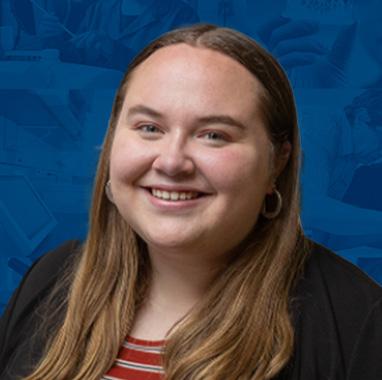
21 CHE.UFL.EDU STUDENT NEWS
Pictured clockwise: Samantha Angelina, Chan Wen Chiu, Chen You, and Aniruddha Kulkarni
STUDENTS HONORED WITH DEPARTMENT AWARDS

An awards ceremony was held on Thursday, Sept. 8, 2022. Congratulations to all recipients and thanks to our alumni and friends for their generous support that made these awards possible.
UNDERGRADUATE AWARDS
John C. Biery Scholarship
Alyssa Massais and Vienna Moran
Boyington/Chapnerkar Legacy Scholarship in Chemical Engineering
Zoharia Dreyfuss and Lydia Thies
Cirioli/Exxon Mobil Friends Scholarship
Danielle Geils, Charlene Nguyen, Dylan Pesante, Catalina Pike, Yanchi Song, and Jaime Sukovich
Fahien Endowed Teaching Scholarship
Monique Bernier and Emerick Gilliams
John P. O’Connell Scholarship Fund
Jostin Armada, Lincoln Frey, Aaron
Harberson, Huston Locht, Mary Lopez
Marin, and Emma Vesco
Proctor and Gamble Chemical Engineering Scholarship
Laurence Barnes and Gabrielle Russo
Shroff Family Endowed Scholarship in Chemical Engineering
Noelia Cabezas, Matthew Chertok, Dylan Carman, Paul Dinh, Adam
Fernandez, Keyla Fernandez, Owen Gillen, Juan Jimenez, Taskina Zaman Jui, Kayla Kent, Ashley Landry, Molly Lynch, Claire Marc, Kerstin Martinez, Duc Huy Nguyen, Timothy Rigaud, Adam Rosenblum, Anna Wojnar, Alex Weaver, and Brendan Wernisch
Howard W. and Norma J. Smoyer
Scholarship/Fellowship in Chemical Engineering
Johnny Brinson, Sean Kochanowsky, Brinsley Hess, and Grace Li
Vazquez Endowed Scholarship
Francisco Correia
Jim Sharp Endowed Memorial Scholarship
Grace Shoemaker
Sophomore & Junior Rising Star Awards
Supported by the Wilson Endowment
Excellence in Research
Asha Rao and Ethan Slaton
Excellence in Leadership
Samuel Sheek and Sophie Williams
Excellence in Service
Axianax Meroni and Jonathan
Valentin
Excellence in Practice
Isabela Brunner and Eduardo
Landaeta Hidalgo
Senior Awards
Research Achievement
Emma Vesco
Professional Achievement
Huston Locht
Leadership & Service to the Profession
Jostin Armada
Service to the Community
Mary Lopez Marin
22 UF | DEPARTMENT OF CHEMICAL ENGINEERING STUDENT NEWS
2021-2022 undergraduate award winners
GRADUATE AWARDS
Ray W. Fahien Graduate Teaching Award in Chemical Engineering
Hayden Good and Igin Ignatius
These awards are provided through generous gifts to the Fahien Endowed Teaching Scholarship fund.
Chemical Engineering Ph.D. Research Excellence Award
Alexander Hoffman, Julie Jameson, Sitong Liu, Long Nguyen, Marisa Pacheco, Xinyi Xia, and Chen You
These awards are provided through generous gifts to the Harold Mills Hawkins Endowed Scholarship funds, the Charles A. and Constance C. Stokes Chemical Engineering Fellowship funds, and Carl Mercer Dow Fellowship funds.
Chemical Engineering Ph.D. Leadership and Service Excellence Award
Alexander Jess, Aniruddha Kulkarni, and Ambar Velazquez-Albino
These awards are provided through generous gifts to the Kydonieus Fellowship and Scholarship fund.
Chemical Engineering M.S. Research, Leadership and Service Excellence Award
Nicholas Macaluso and Cong Sun
These awards are provided through generous gifts to the Arnold J. “Red” Morway Memorial Graduate Fellowship fund.
Chemical Engineering Ph.D. Peer Mentors for the 2022-2023 academic year
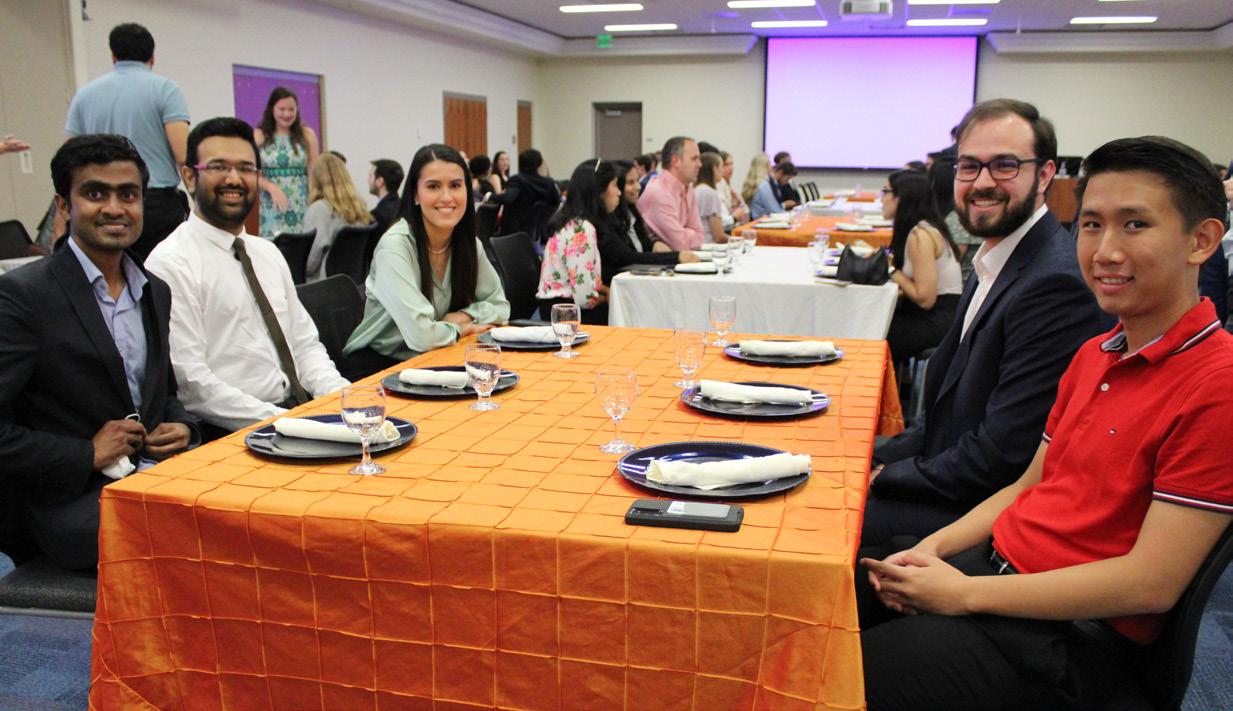
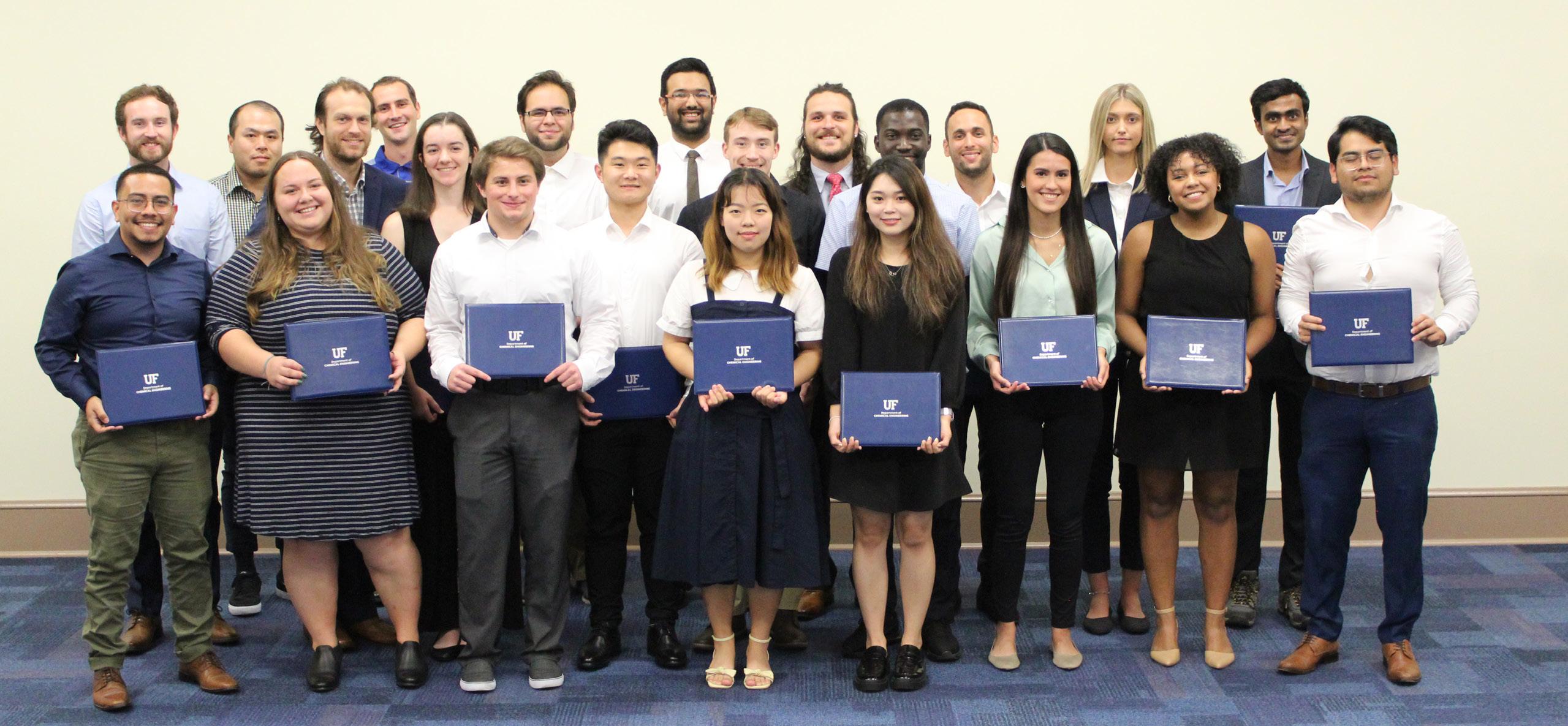
Hansel Montalvo, Marisa Pacheco, and Jackson Powers
These students applied and were nominated by their Ph.D. Advisors and received an award thanks to a generous gifts from our alumni.
Herbert Wertheim College of Engineering
Dean’s Research Award
Minji Chang, Thomas Corbin, Lauren Eccles, Eric Imhoff, Lawton Long, Jasmine McTyer, and Sage Nelson
Chemical Engineering Excellence Fund
Bernard Biney, Seokjun Han, Yinhao Jia, Ryan Johnson, Sree Laxmi, Luis Lopez de la Masa, Carlos Orosco, and HsiaoHsuan Wan
23 CHE.UFL.EDU STUDENT NEWS
2021-2022 graduate award winners
L to R: Igin Ignatius, Aniruddha Kulkarni, Ambar Velazquez-Albino, Adam Fernandez, and Paul Dinh
STAFF UPDATES
THE DEPARTMENT WELCOMES NEW STAFF
Gabrielle Donalson joined the department as a Graduate Academic Advisor II on Feb. 14, 2022.
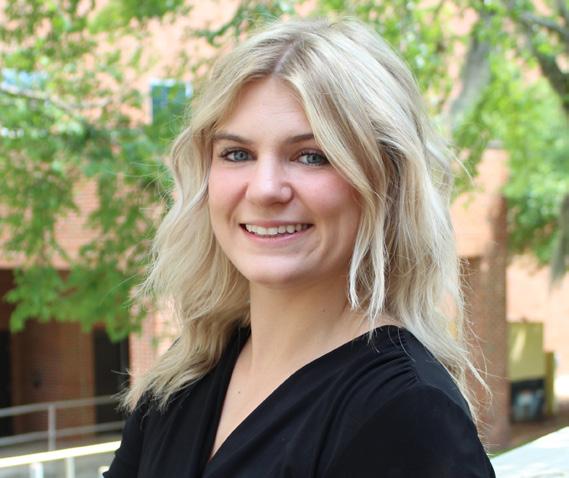
Donalson holds a B.S. in Chemistry from Colorado Mesa University and a M.S. in Chemistry from the University of Florida.
Her perspective as a graduate student in a closely related field and her experience in recruiting students to the chemistry graduate program at UF will contribute to increasing the reach and effectiveness of our graduate recruiting efforts and to organizing events and activities that support our students. Donalson will also assist Shirley Kelly with graduate advising.
SAIN RETIRES AFTER NEARLY 20 YEARS
After nearly 20 years of dedicated service to our students and department, Cynthia Sain retired on July 29, 2022.

“She has been an exemplary student advisor and her excellence has been recognized with several awards, among them the College Advisor of the Year, the College Innovation/Creativity Award, and Superior Accomplishment awards. I am deeply grateful for all that she has done,” said Spyros Svoronos, Ph.D. , Harry and Bertha Bernstein Professor and Undergraduate Programm Coordinator.
SANDOVAL RETIRES AFTER 38 YEARS
After 38 years of service to our department and the university, Debbie Sandoval retired on Dec. 31, 2021.
“Debbie first joined Chemical Engineering in 1972, at a time when secretaries typed on a typewriter, and manually changed printheads to type equations. She was truly amazing - practically error free. She left the department in 1975, but happily rejoined in 1986 and stayed until her retirement. She successfully transitioned to wordprocessing, where her excellent typing and grammar skills proved invaluable to many faculty members. She could even read Dr. Lew Johns’s handwriting! Debbie made other transitions, including becoming the Chair’s secretary and finally the main support person for both the graduate and the undergraduate programs. Our students have greatly benefited from Debbie’s work,” said Dr. Svoronos.
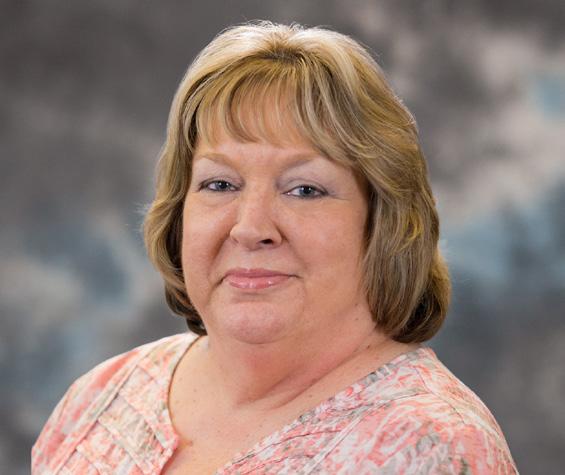
24 UF | DEPARTMENT OF
ENGINEERING
CHEMICAL
DEPARTMENT NEWS
CHE HOSTS OUTSTANDING INVITED SEMINAR SPEAKERS
UF ChE hosted a vibrant, virtual and in-person seminar series where invited speakers shared their latest research and met with faculty and students each week.
Kyle J. M. Bishop, Ph.D. Professor
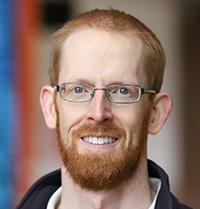
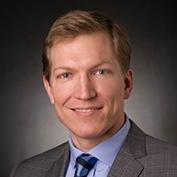
Columbia University Spring 2022
Michael Dickey, Ph.D.
Camille and Henry Dryfuss Professor
North Carolina State University
Spring 2022
Ankur Gupta, Ph.D.

Assistant Professor
University of Colorado Boulder
Fall 2021
Benjamin Hackel, Ph.D.
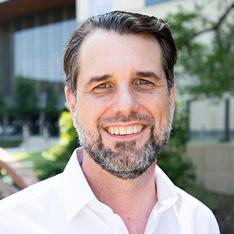
Associate Professor
University of Minnesota
Fall 2021
James Henderson, Ph.D.
Associate Professor
Syracuse University
Fall 2021
Arthi Jayaraman, Ph.D.
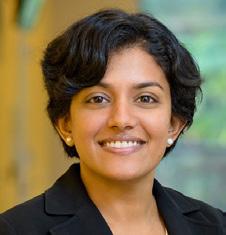
Centennial Term Professor for Excellence in Research and Education

University of Delaware
Fall 2021
Albert J. Keung, Ph.D. Assistant Professor

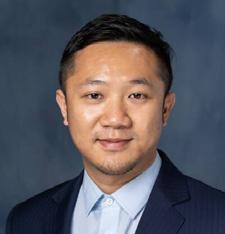
North Carolina State University
Spring 2022
Hang Lu, Ph.D.
Love Family Professor
Georgia Institute of Technology
Fall 2021
Biwu Ma, Ph.D. Professor
Florida State University
Fall 2021
James Moon, Ph.D.
John Gideon Searle Associate Professor
University of Michigan, Ann Arbor
Fall 2021
Sarah L. Perry, Ph.D. Associate Professor


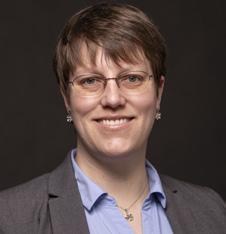
University of Massachusetts Amherst
Spring 2022
Anne Skaja Robinson, Ph.D. Trustee Professor and Department Head
Carnegie Mellon University
Spring 2022
Jessica Schiffman, Ph.D.

Associate Professor and Associate Department Head
University of Massachusetts Amherst
Fall 2021
Daniel Schwartz, Ph.D.
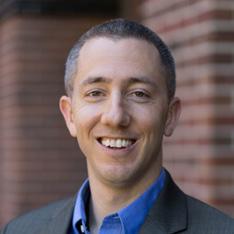

Boeing-Sutter Professor
University of Washington
Fall 2021
Blanka Sharma, Ph.D.
Associate Professor of Biomedical Engineering
University of Florida
Fall 2021
Thomas M. Truskett, Ph.D.
Dick Rothwell Endowed Chair
University of Texas at Austin
Spring 2022
Margot Vigeant, Ph.D.
Rooke Professor
Bucknell University
Fall 2021
Idalis Villaneuva Alarcón, Ph.D. Associate Professor
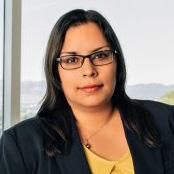
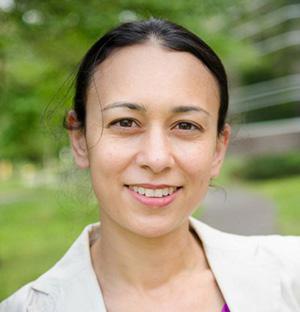
University of Florida
Spring 2021
Fan Zhang, Ph.D. Assistant Professor
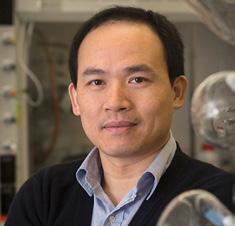
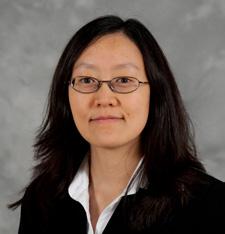

University of Florida
Spring 2022
25 CHE.UFL.EDU STUDENTSEMINARHIGHLIGHTS SPEAKERS
GIFTS TO THE DEPARTMENT
We are thankful to all of our donors in July 2021-June 2022. Every gift, large or small, makes a difference and helps advance and improve student experiences at ChE. Your gifts to the Chemical Engineering Excellence Fund support scholarships, fellowships, faculty, and unrestricted support for the department.
We would especially like to recognize our major donors (gifts at $500 and above) this year:
American Institute of Chemical Engineers
Juan and Zoe Barinaga
Chris and Julianne Birdsall
Robert Brugman
CDM Smith
Ray Cocco
Robert and Danielle Curzi
Chand Deepak
Madhav Durbha and Aparna Peethambaram
Fred and Bonnie Edie
ExxonMobil
Robert Goodmark
Robert Heinle
Mary Beth Jakab
Wayne Johnson
Jatinder Jolly
Nick Katzaras
Tyler and Amber Koutney
Agis Kydonieus
Nathan Lee
Melanie Lewis
James Mayeaux
Thomas and Sally Moore
John O’Connell
Daniel O’Neil
Suresh and Brigitte Pahwa
Kent Probst
Matt Pytosh
Charles Revette
Jim and Bobette Sandy
Larry and Marilyn Seward
Jayant and Dr. Yogini Shroff
The Hanwha Group
Tokyo Electron Limited
Douglas White
Weldon and Elaine Wilson
Randall L. Ledkins, Senior Director of Development

Each year I am humbled by the generosity of our alumni in support of Chemical Engineering. Your passion for this department is evident through your commitments, elevating the not only the department, but the college and the University of Florida. Your support allows our student groups to be able to compete on a global stage, and our faculty to produce world renowned research. It allows first generation college students needed scholarship funds allowing them to focus on their work in the laboratory and classroom, eliminating financial stressors.
We are a great university, college, and department, and we are strengthened by your continued support. Let’s start a conversation today as to how your philanthropy can be the difference maker for our students, faculty, and the department.
YOU CAN HELP POWER THE NEW ENGINEER!
Make an online gift today at www.che.ufl.edu or use the QR code.
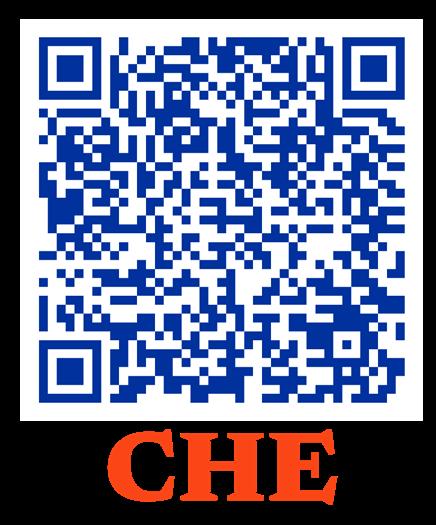
26 UF | DEPARTMENT OF CHEMICAL ENGINEERING
DEPARTMENT SUPPORT
26 UF | DEPARTMENT OF CHEMICAL ENGINEERING
ALUMNUS AWARDED 2021
AMERICAN HEART ASSOCIATION POSTDOCTORAL FELLOWSHIP
Qiao Zhang, Ph.D. , (Ph.D. ChE ’18), was awarded the 2021 American Heart Association Postdoctoral Fellowship. With this award, he will study how cellular force, which is transmitted by the LINC complex, the protein complex associated with both inner and outer membranes of the nucleus (LINC complex), to the nucleus, could contribute to the early development of cardiovascular disease. Dr. Zhang will use Hutchinson-Gilford progeria syndrome as a model system.
Dr. Zhang’s research interests focus on testing novel approaches to differentiation iPSCs to endothelial cells, finding out how preexisting adaptive immunity to Cas9 proteins could affect CRISPR-Cas9 based gene therapies in human muscular dystrophy, and identifying how abnormal cellular and nuclear force distributions could contribute to cell or tissue dysfunctions in Hutchison Gilford Progeria Syndrome.
Dr. Zhang is originally from Guangzhou, China. He received a B.S. in chemical engineering from the University of Minnesota, Twin Cities in 2009, and a Ph.D. from the University of Florida in 2018. He is a postdoctoral fellow at Duke University in the lab of George A. Truskey, Ph.D.
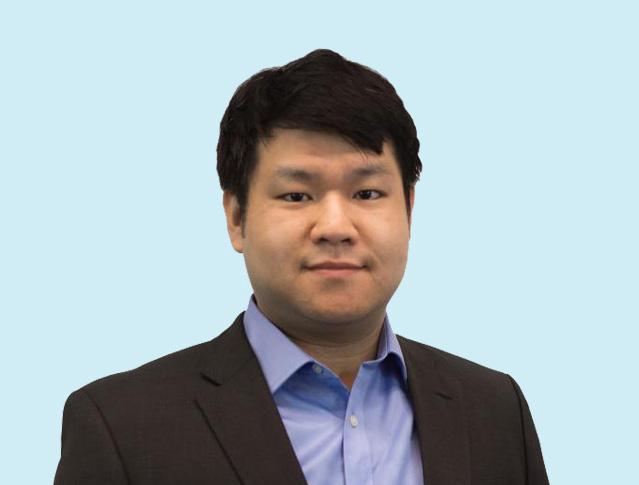
The American Heart Association is one of the largest funding organizations for cardiovascular medical research.
Written by Michelle Runyon
27 CHE.UFL.EDU
ALUMNI UPDATE
Marissa Dockendorf, Ph.D. , (Ph.D. ChE ’05), Executive Director, Head of Global Digital Analytics & Technologies at Merck & Co. Inc., presented to students in the Department of Chemical Engineering about her career progression through industry.
Dr. Dockendorf has worked in the pharmaceutical industry for 14 years and at Merck for 10 of those years. She has a background in pharmacokinetics (Pharmacokinetic-Pharmacodynamic PK/PD) modeling. She’s participated in many cross functional drug development teams and provided pharmacokinetic and pharmacometric expertise and scientific oversight for a number of discovery, early, and late-stage drug development programs across multiple therapeutic areas, with particular focus in the areas of cardiovascular disease, neuroscience, and ophthalmics. She plays a critical role in innovation projects at Merck Research Laboratories aimed at transforming the way clinical trials are conducted, including use of emerging technologies and use of outpatient sampling in clinical trials.
In her current role as Digital Health Portfolio Lead, she works with project teams to develop and implement strategic plans for use of digital health

Dockendorf Talks Career Progression in Drug Development
solutions in clinical programs to address key drug development questions. Dr. Dockendorf received her B.S. in Chemical Engineering from the Illinois Institute of Technology, her M.S. in Biomedical Engineering, and Ph.D. in Chemical Engineering from the University of Florida.
Q: What was the best aspect of your experience at UF CHE?
I had such a wonderful experience as a graduate student in the CHE department that it is hard to pick a “best.” I worked on an interesting Ph.D. project, had many opportunities to publish and present my research, and left grad school well-prepared for my career ahead. I also made some of my closest friends to this day during my time there!
Q: What is your favorite memory of your time as a student?
I have so many fond memories from my time as a graduate student. I actually met my husband in a class at UF! One moment that I often reflect on that may be more relevant for current students is related to an Intro to Engineering class I used to TA. In that class, I would give a presentation about chemical
28 UF | DEPARTMENT OF CHEMICAL ENGINEERING ALUMNI SPOTLIGHT
engineering to undecided undergraduate engineering majors, which included discussion on how chemical engineers were the “universal engineer,” with many different possible career paths. At the time I didn’t realize how true that was! My own career path has not involved taking what would be considered “traditional chemical engineering” roles, and I know many people who are chemical engineers by training that are now working in a variety of different areas. It has been wonderful to see what I used to lecture on play out in practice in my own life!
Q: Who influenced you during your time at UF?
My graduate research advisor, Dr. Anuj Chauhan , has and continues to be a great mentor to me. During my time as a graduate student, he helped me to develop my research, experimentation, and modeling skills. Beyond the technical aspects, he encouraged me to present my research in various symposia and conferences and hone my presentation skills. He also helped me to find a summer internship during my time as a student that later helped land me a job at that same company, and provided me with a lot of career advice, both during my initial job search as well as throughout my career.
Q: How did this time influence your career?
During my career I have worked in pharmaceutical R&D in the areas of quantitative pharmacology & pharmacometrics, ocular drug delivery, and now digital medicine. My experiences at UF really opened my eyes to many different possible career options. It was during my graduate research that I worked on developing a physiologically based pharmacokinetic model and first became aware of the field of pharmacometrics as a career path. I also learned a lot about ocular drug delivery from my advisor and others in my lab, which is a field in which I also later worked.
Q: How have you stayed connected to the Gator Nation?
I have many friends from my time at UF that I keep in touch with and a few that have ended up working at the same company as me (Merck & Co. Inc.). I have been a recruiting ambassador for my company and enjoy meeting others from the Gator Nation at conferences (back when they were in-person), and I can’t wait to do so again when conferences return to being in-person!
Q: Have you faced a challenge in your career and how did you overcome it?
One of the challenges I faced was of a more personal nature. My husband and I had the classic “two body” problem in trying to find two Ph.D. level jobs in the same location. My husband found a job in California, and after having worked at another company I wanted to return to Merck & Co. Inc. in Pennsylvania. I asked about remote work as a possibility, and fortunately, had a very supportive supervisor that hired me back and allowed me to work remotely from California. I ended up working remotely for over 10 years, first from California and later from Florida. I’m very grateful that my company supported this remote work arrangement and I have learned that it is best to simply ask for what you want to enable your success and work/life balance.
Q:
What advice do you have for current students?
Use this time to learn and explore various things you are interested in. Take advantage of opportunities to get involved in the wider scientific community and seek out mentors that can help you navigate your job search and offer career advice. Take every opportunity you have to present your research findings and develop your presentation skills; the GRACE symposium is a great forum for this! Most importantly, enjoy the journey, pursue a career path that you are truly excited about, and don’t be afraid to change jobs or even career paths to suit your personal and professional needs.
29 CHE.UFL.EDU ALUMNI SPOTLIGHT
THE SHROFF FAMILY CREATES A LEGACY OF GIVING
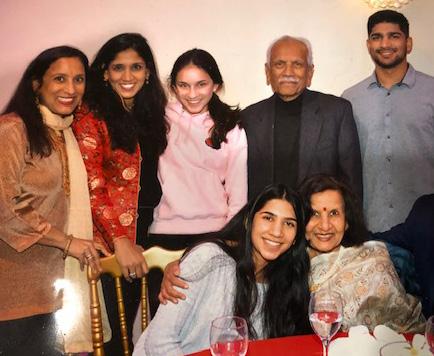
After graduating from the University of Florida in 1965 with a bachelor’s degree in chemical engineering, and then earning his master’s in engineering and an MBA, Jayant Shroff worked for 10 years in R&D jobs at Fortune 500 companies including Bell Labs, AT&T, Lucent Technologies, and ExxonMobil Research and Engineering. His professional career in the U.S. spans over four decades and he has held many executive positions. He married his best friend, Dr. Yogini Shroff, a practicing physician. Both emigrated to the United States in the 1960s, and together they enjoyed growing their successful careers.
The Shroff family is focused on mentoring young people to be leaders through Shroff Family Foundation scholarships in Chemical Engineering at University of Florida and Engineering college scholarships at Sarvajanik Education Society in Surat, Gujarat. The Shroff Family also co-founded Yuva Pragati, a non-profit organization dedicated to educating the impoverished rural youth of Gujarat, India. At home in Metuchen, N.J., the Shroff’s community service involves board membership at a local senior center and food bank.
Q: What is your favorite memory of your time as a student?
In 1964, I choreographed an Indian folk dance called Raas from the state of Gujarat in India for an international dance competition. We had eight participants who had no idea about dancing. It required a lot of improvisation. Anyway, we came first among 10 entries! I will never forget the moment when the judges announced the winners. At midnight, we all went out for ice cream to celebrate. These outings brought a lot of joy.
Another memorable day was in the spring trimester in 1965, when I was called into Dr. Charles Hukaba’s office. Dr. Hukaba offered me a graduate assistantship at Drexel University for a master’s degree in chemical engineering. Dr. Hukaba had accepted the position of Department Chair at Drexel beginning in the Fall 1965. I was overjoyed with this unexpected offer and decided to accept it.
I was quite shy when I first enrolled at UF. However, by the time I graduated I developed confidence in my abilities, acquired excellent communication skills, and
30 UF | DEPARTMENT OF CHEMICAL ENGINEERING ALUMNI FEATURE
enhanced my critical thinking and analytical skills. This confidence helped me to be successful throughout my professional career.
Q: What advice do you have for current students? Success is 90% hard work, 5% intelligence and 5% luckbeing in right place at the right time. Focus is another dimension for success. Capture every opportunity you get and explore it to best of your abilities.
Be kind and humble, help others, it will give you a lot of joy and fulfillment in life which any amount of money cannot give. The bounty will come back to you some day. This is from our own experience of more than 40 years of giving.
Q: What impact do you hope your gift has for UF ChE students?
We have always believed that education is the first step toward transformation and success in life. And we are very proud that we got an opportunity to assist young people in achieving their dreams.
Q: If you could change the world, what would you do? We would change the definition of success from acquiring
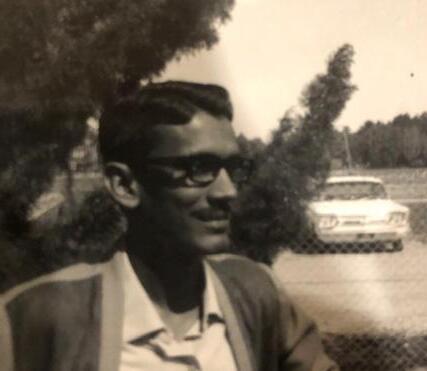
a lot of wealth and resources to being kind, respectful to each other, being a good citizen and concentrate on being happy and content. In the schools we support, we teach these qualities to children at an early age and call it “VALUE EDUCATION.”
Q: What makes you most proud?
Our desire and ability to help more than 100,000 children with no means in remote villages of India acquire good education, become valuable citizens, and achieve economic independence.
For the past 25 years or more all celebrations (birthdays, anniversaries, graduations, new job offers, etc.) in our family have started with appropriate donations to a worthy cause. Our daughters celebrated our 50th wedding anniversary (we did not want a big party) by building a large assembly hall in a residential school for children of migrant workers in the village of Wanghadhra in Gujarat, India.
With the equal support of my wife Yogini and daughters Viraj and Radhika, our son-in-laws Ojas Mehta and Seth Bair, and few like-minded friends we have embarked on this mission since 1982.

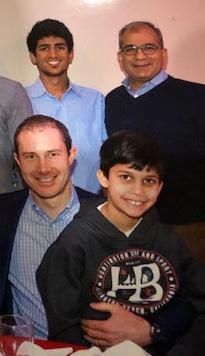
31 CHE.UFL.EDU ALUMNI FEATURE
Shroff Family Photo, Left to right standing: Dr. Viraj, Radhika, granddaughter Ashima, Jay, grandsons Tilak and Anay, Son-in-law Ojas. Left to right seated: granddaughter Urvi, wife Dr. Yogini, son-in-law Seth, and grandson Santosh.
Jayant Shroff in 1963
Read the full story on our website.
Jayant and Dr. Yogini Shroff
P.O. BOX 116005
GAINESVILLE, FL 32611
WWW.CHE.UFL.EDU
UPCOMING EVENTS
DINESH O. SHAH ANNUAL LECTURE IN SURFACE SCIENCE
MATTHEW V. TIRRELL, PH.D.
Dean of the Pritzker School of Molecular Engineering

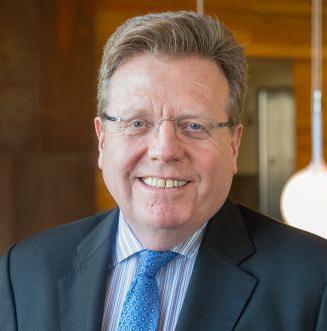
University of Chicago
October 24, 2022
AICHE ANNUAL MEETING
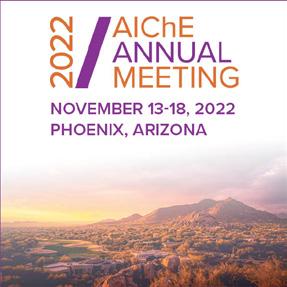

Phoenix Convention Center
Phoenix, AZ
November 13-18, 2022
ENDOWED DISTINGUISHED LECTURE IN FLUID MECHANICS
NORMAN J. WAGNER, PH.D.
Unidel Robert L. Pigford Chair in Chemical Engineering
University of Delaware
April 17-18, 2023
@UFLC h E


























 Written by Catherine Arnold
Written by Catherine Arnold



























































